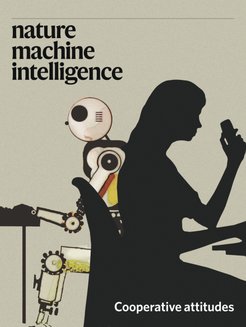Sample Project: Human-machine cooperation

Since Alan Turing envisioned Artificial Intelligence (AI), a major driving force behind technical progress has been competition with human cognition (e.g. beating humans in Chess or Jeopardy!). Less attention has been given to developing autonomous machines that learn to cooperate with humans. Cooperation does not require sheer computational power, but relies on intuition, and pre-evolved dispositions toward cooperation, common-sense mechanisms that are difficult to encode in machines. We develop state-of-the-art machine-learning algorithms that cooperate with people and other machines at levels that rival human cooperation in two-player repeated games.
Scientific Writings
I. Rahwan, J. W. Crandall, J.-F. Bonnefon (2020). Intelligent Machines as Social Catalysts. Proceedings of the National Academy of Sciences. (commentary)
F. Ishowo-Oloko, J.-F. Bonnefon, Z. Soroye, J. W. Crandall, I. Rahwan, T. Rahwan (2019). Behavioural Evidence for a Transparency-Efficiency Tradeoff in Human-Machine Cooperation. Nature Machine Intelligence.
[Paper + Appendix, free read-only version] [Selected media: Commentary in Nature Machine Intelligence, Boston Globe (op-ed), Scientific American (podcast), Scientific American (article), Psychology Today, New Statesman, Wired, Nature Middle East]
J. W. Crandall, M. Oudah, Tennom, F. Ishowo-Oloko, S. Abdallah, J.-F. Bonnefon, M. Cebrian, A. Shariff, M. A. Goodrich, I. Rahwan (2018). Cooperating with Machines. Nature Communications. Vol. 9, Article No. 233.
[Selected Media: Science, The Register, La Repubblica, MIT Technology Review, New Scientist, Inverse, Le Monde]
Media

